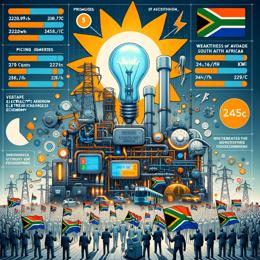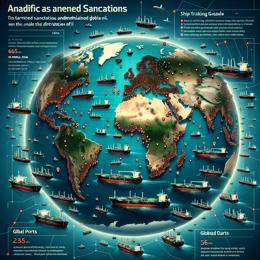Image created by AI
Free Electricity Failures: South Africa's Municipal Mismanagement Leaves Millions Without Promised Relief
South Africa’s intention to alleviate the financial pressures of energy costs on its impoverished communities through free basic electricity is being undermined by widespread municipal mismanagement. Approximately ten million South African households are eligible to benefit from the government's policy to provide 50 kWh of free electricity monthly, adequate for essential needs. Despite this, an astounding eight million households are left without access to this essential service.
At a recent briefing, Electricity Minister Kgosientsho Ramokgopa emphasized the massive shortfall between the policy's intent and its on-the-ground execution. Electricity tariffs have surged, outpacing general inflation by fivefold since 2008, adding significant strain on many citizens. This financial burden, paired with the government's failure to effectively deliver key services, sparks serious concerns and potential instability.
The benefits, designed to assist households registered as indigent, on the lifeline electricity tariff, or eligible for a pensioner’s rebate, are not reaching those in need. Minister Ramokgopa stated, “It is not a funding problem, but an execution problem at the level of municipalities.” The central government provides funding, yet local entities often redirect these monies to other areas, failing the very people they aim to support.
South Africa's municipalities, already dealing with financial stress due to a stagnant economy and slow revenue growth, are a critical bottleneck. The redirection of funds intended for basic services to other municipal areas exemplifies deep-rooted inefficiencies and potentially corrupt practices. Energy analyst Chris Yelland underscores the malaise in the system, as the National Treasury and government bear witness to the misappropriation.
The disparities in energy costs have starkly materialized in Johannesburg, where City Power, wholly-owned by the City of Johannesburg, has significantly hiked prepaid electricity prices for lower consumption brackets. Yelland notes that these price increases disproportionately impact the city's poorer residents, risking heightened social unrest in the wake of financial disparity.
Minister Ramokgopa acknowledges that economic growth, beyond stretching free basic services, is essential to resolving the crises. However, without an improvement in governmental efficacy and economic progress, the state’s finances will remain precarious, and policy failures will continue to affect South Africa’s most vulnerable populations. The urgency to address municipal mismanagement is stark, and it stands as a crucial step towards a more equitable and stable energy future in the country.










